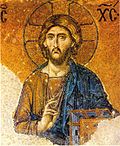- Nicholas Cabasilas
-
Part of a series on Eastern Christianity 
History Orthodox Church History
Specific regions:
Byzantine Empire
Ecumenical council
Christianization of Bulgaria
Christianization of Kievan Rus'
East-West Schism
Asian Christianity
Coptic Egypt · UkraineTraditions Orthodox Church
Others:
Oriental Orthodoxy
Ethiopian Tewahedo Church
Coptic Church
Church of the East
Eastern Catholic Churches
Syriac ChristianityLiturgy and worship Sign of the cross
Divine Liturgy
Iconography
Asceticism
OmophorionTheology Hesychasm · Icon
Apophaticism
Filioque clause
Miaphysitism
Monophysitism
Diophysitism
Nestorianism
Theosis · Theoria
Phronema · Philokalia
Praxis · Theotokos
Hypostasis · Ousia
Essence vs. Energies
MetousiosisNicholas Cabasilas (Greek: Νικόλαος Καβάσιλας; born 1319/1323 in Thessalonica;[1] died after 1391) was a Byzantine mystic and theological writer.
Cabasilas is a saint within the Orthodox Church. His feast day is June 20.[2][3]
Contents
Life
He was on intimate terms with the emperor John VI Cantacuzene, whom he accompanied in his retirement to a monastery. In 1355 he succeeded his uncle Nilus Cabasilas, like himself a determined opponent of the union of the Orthodox and Latin churches, as archbishop of Thessalonica.
In the Hesychast controversy he took the side of the monks of Athos and Saint Gregory Palamas.
Works
His chief work is his Περὶ τῆς ἐν Χριστῷ ζωῆς,[4] in which he lays down the principle that union with Christ is effected by the three great mysteries of baptism, confirmation, and the eucharist. He also wrote homilies on various subjects, and a speech against usurers, printed with other works in Migne, Patrologia Graeca, c. i. A large number of his works is still extant in manuscript.
Cabasilas' major works are Life in Christ and Commentary on the Divine Liturgy. These works display a profound understanding of the sacramental and liturgical life of the Eastern Orthodox Church and are accessible to and instructive for any Christian today worshiping in either the East or West.
See also
References
- C. Krumbacher, Geschichte der byzantinischen Litteratur (1897)
- Herzog-Hauck, Realencyklopadie fr protcstantische Theologie (1901)
- Parry, Ken; David Melling (editors) (1999). The Blackwell Dictionary of Eastern Christianity. Malden, MA.: Blackwell Publishing. ISBN 0-631-23203-6.
Notes
- ^ http://books.google.com/books?id=iE45LzrfZuwC&pg=PA10&dq=Nicholas+Cabasilas&sig=_h6j3HmT5IXDM2n5WO3DJugxXZk
- ^ http://www.oca.org/FSLivesAllSaints.asp?SID=4&M=6&D=20
- ^ http://goarch.org/en/chapel/todaywecelebrate.asp?M=6&D=20&Y=2006
- ^ ed. pr. of the Greek text, with copious introduction, by W. Gass, 1849; new ed. by M. Heinze, 1899.
 This article incorporates text from a publication now in the public domain: Chisholm, Hugh, ed (1911). Encyclopædia Britannica (11th ed.). Cambridge University Press.
This article incorporates text from a publication now in the public domain: Chisholm, Hugh, ed (1911). Encyclopædia Britannica (11th ed.). Cambridge University Press.
Bibliography
- Cabasilas, N. Commentary on the Divine Liturgy. 14th Cent. Translated by J.M. Hussey and P.A. McNulty. St. Vladimir's Seminary Press, 1960. ISBN 0-913836-37-0
- Cabasilas, N. The Life in Christ. St. Vladimir's Seminary Press, 1974. ISBN 0-913836-12-5
- Eugenia Russell, ‘Nicholas Kavasilas Chamaëtos (c.1322–c.1390), a unique voice amongst his contemporaries’, Nottingham Medieval Studies 54 (2010), 123–37
External links
Categories:- 14th-century births
- 1391 deaths
- Byzantine theologians
- Byzantine saints
- Byzantine writers
- 14th-century Byzantine people
- 14th-century writers
- Eastern Orthodox saints
- Greek religious writers
- Lay theologians
- Byzantine Thessalonian writers
- Byzantine archbishops of Thessalonica
- 14th-century Christian saints
- Eastern Orthodox theologians
- Saints of Byzantine Thessalonica
- Christian mystics
Wikimedia Foundation. 2010.
